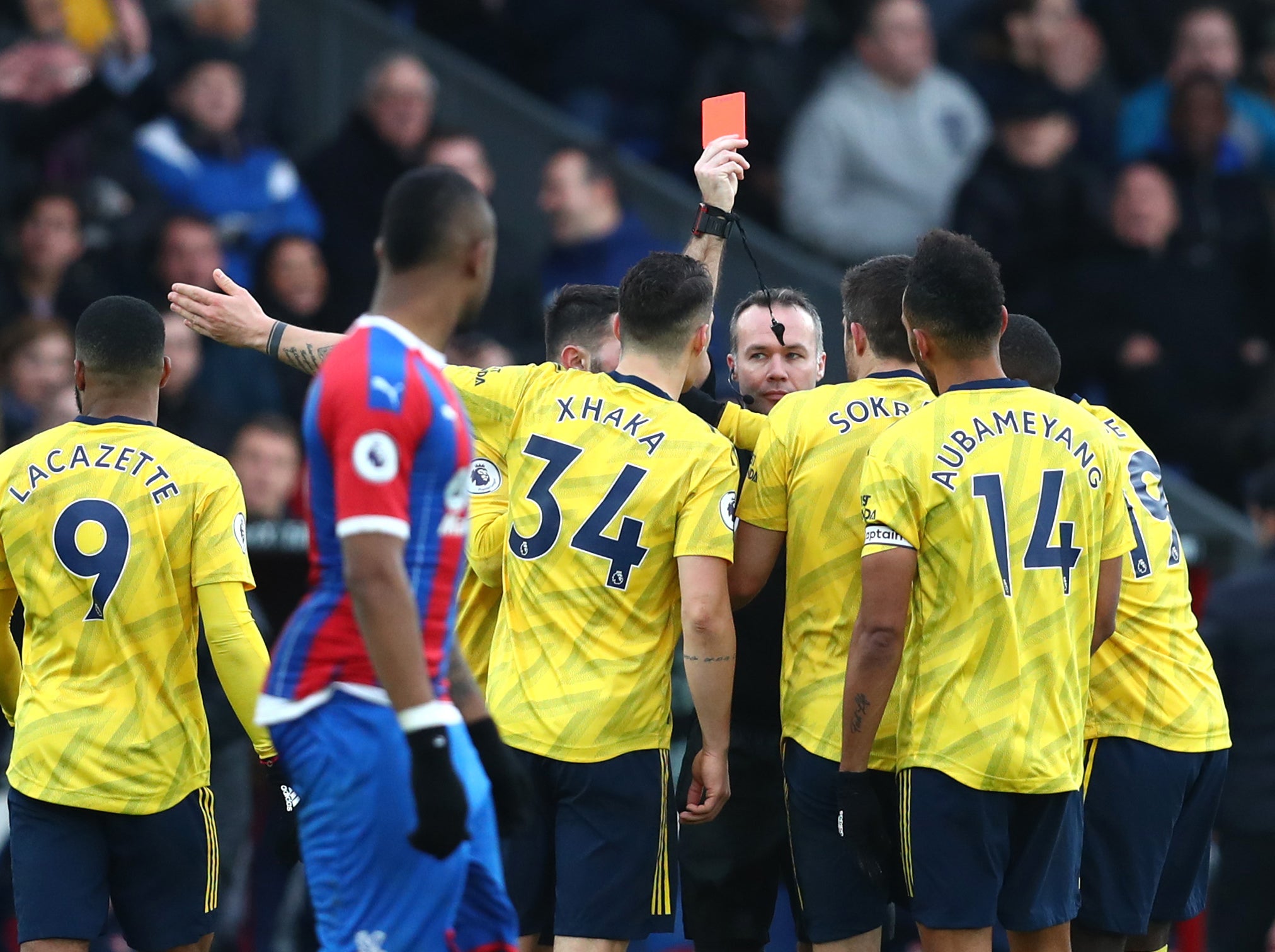How Pierre-Emerick Aubameyang’s ban will provide sternest test of Mikel Arteta’s early Arsenal reign
Gunners will be without their talisman for the next three games following his red card against Crystal Palace
“Well, losing probably our most important player is never nice,” Mikel Arteta winced in a surprisingly honest – if not blindingly obvious – admission after Saturday’s 1-1 draw against Crystal Palace. But then, even in this embryonic stage of his reign, there’s little time to waste on pretence. And if Arsenal’s top-four ambitions weren’t already eradicated by the rolling inferno of Unai Emery’s demise, Pierre-Emerick Aubameyang’s three-game suspension is far more damaging to their progress than points dropped at Selhurst Park.
So often this season Aubameyang has been Arsenal’s saviour. You only need to look at the raw statistics – 14 of the club’s 29 league goals – to see quite how significant he’s been in propping up the wreckage. But now, Arsenal face the ominous prospect of fixtures against Sheffield United and Chelsea without their talisman in what will arguably be the harshest litmus test of the club’s transformation under Arteta so far.
“We have other players that can play in that position,” Arteta encouraged, even if it feels a fanciful burden to place on Reiss Nelson and Gabriel Martinelli. “We will try to find a way and be as competitive as possible. Hopefully, they have to take a step forward now. If he’s not able to contribute to the team with goals like this then someone else has to do it and I want to see that reaction too.”
The draw against Palace epitomised where Arsenal’s early evolution currently stands. An exciting tactical foundation, clinging defensive vulnerabilities, and an underlying battle between renewed urgency and old habits exhibited over the course of a wildly inconsistent 90 minutes.
For the first third of the match, Arsenal were in free-flow. The passing was slick, the press full-blooded, the full-backs barrelling forwards in support, unshackled by the discipline of Lucas Torreira and Granit Xhaka’s resuscitation as the team’s creative heartbeat. Aubameyang’s goal – an 18-pass product of patient and precise build-up before suddenly exploding into attack – was the distillation of Arteta’s champagne vision. Enough to fill any supporter with tipsy promise.
“I think the first 35 minutes were exactly what I want our Arsenal team to play like,” Arteta said. “We were very dominant, we controlled the game, we were in the right positions and we were so good in transition.” Those are the fundamentals Arteta has begun to ingrain so quickly, even if Arsenal don’t yet have the pace or practice to sustain them.
The fatty edges are being steeled too. Arteta’s first action as manager was to clear the dregs of non-commitment which had lingered during Freddie Ljungberg’s stint as caretaker. And within a matter of weeks, he appears to have already stamped out any seeds of infighting and silenced speculation of individuals’ futures. That sense of spirit and unity provided a resistance greater than any tactical understanding during the feisty and frenetic end to the game following Aubameyang’s dismissal. Even the red card itself, while bearing no intended nastiness, was emblematic of the “100mph” will-power and aggression he’s coaxed from all of his players.
Ultimately, though, old scars are still never too far from the surface. The window into the past may only have opened for eight minutes at the start of the second half, but there was a distinct nonchalance in the way Arsenal dropped off, almost expecting Palace to sit back and surrender. Last Monday against Leeds, Arteta’s team-talk electrified his players. This time, the response was static. And while Jordan Ayew’s goal may have benefited from a fortunate deflection, it was the product of a routine set-piece which had begun near the halfway line.

“It’s game management and we’ll get better at that in the future, hopefully, and we need to know at this type of ground you’re going to be put on the back foot in many situations,” Arteta said.
“We reacted good, but in the second half we had to show more in the first 10 or 15 minutes and improve,” Sokratis agreed. “We switched off.
“We took an unlucky red card and after it was difficult. We had to fight more, to show more spirit and to give everything. In the end, one point I think we are not happy with, but it’s not also the worst.”
In a sense, Sokratis is right. With Arsenal’s top-four expectations all but extinguished, Arteta has been afforded the rare luxury of having time to trial and experiment with his players, root a fresh ideology, strip away at the old and rebuild something stronger from what remains.
Surviving without Aubameyang, whose future will inevitably come under scrutiny again this summer, is a vital part of that too. And finding a way to keep improving the structure of his side without the man who’s so often been its backbone this season may well be the trickiest challenge Arteta faces of all.
Join our commenting forum
Join thought-provoking conversations, follow other Independent readers and see their replies
Comments